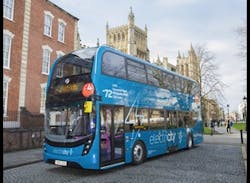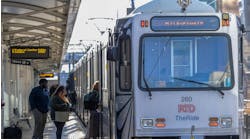Two virtual electric buses were launched in January in Bristol. First West of England are introducing the low emission buses in partnership with Department for Transport, Bristol City Council and University of the West of England (UWE).
The buses use Geo-Fencing GPS technology to run on pure electric mode in areas of low air quality, producing zero emissions. The small diesel engine only runs in areas of better air quality and simply charges the electric engine. There are only five in the U.K., two in Bristol and three in London on a trial basis. Engineers and scientists will examine how the bus performs and crucially their environmental impact.
These buses will turn heads in their blue colour scheme and "electricity" branding.
The buses also have a unique way of charging. Once they reach UWE’s Frenchay Campus (the terminus of their route) a special plate in the ground will charge the buses wirelessly.
James Freeman, managing director of First West of England said, “Bristol is the perfect place to trial technology like this. During the Green Capital year in 2015 we trialled a Bio-Methane powered ‘poo bus’ so it is great that we now have another exciting trial.”
“These buses will make a massive impact to air quality as they spend a huge part of the day running on pure electric mode, meaning that in areas where pollution is a problem, these buses will quite literally be a breath of fresh air”
The buses will feature on Service 72 which runs from City Centre to UWE’s Frenchay Campus via Whiteladies Road & Gloucester Road. The bus will run in full electric mode throughout the City Centre, the diesel engine automatically turns on to recharge the batteries at the start of Whiteladies Road where the air quality improves. Once the buses reach the more polluted Gloucester Road they will again revert to all-electric mode.
George Ferguson, mayor of Bristol said, “I am delighted that we have been able to launch this cutting edge technology in Bristol, as the first city outside of London to do so.
“This adds to Bristol’s growing reputation as a laboratory for change and an environmental innovator. These clean tech vehicles will help to reduce pollution and improve the health of the city, and are part of the continuing impact of our highly successful year as European Green Capital 2015.”
“My goal is for Bristol to be one of the healthiest cities in the world and that has to start with us breathing clean air.”
“I am confident this trial of new technology will pave the way for the future of electric buses in Bristol and beyond, adding to the many new sustainable transport initiatives that are currently taking place across the city.”
The buses are expected to enter service at the end of January.



